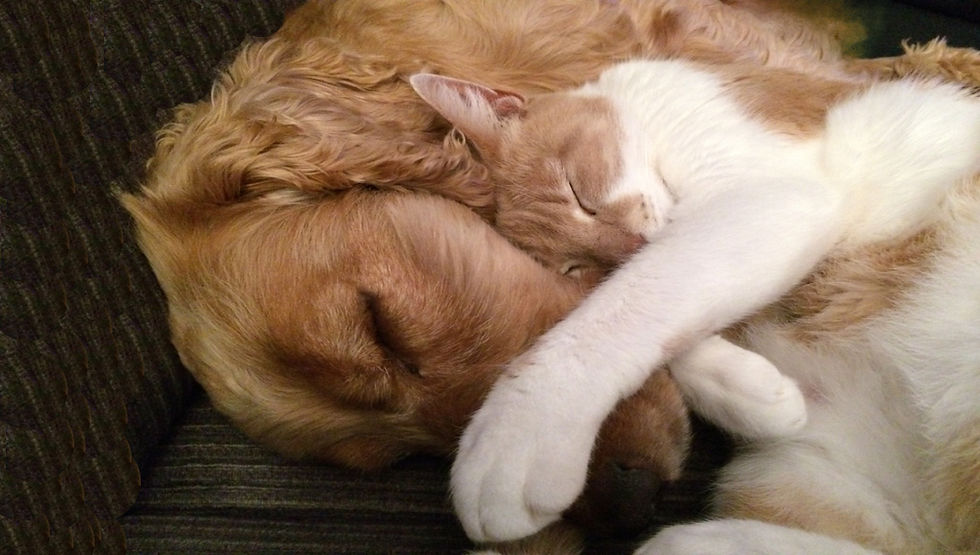Take good Care of your Senior Animals
- Sabina

- Jul 10, 2024
- 3 min read
Updated: Sep 15, 2024
« My dog's behavior is changing. She's not the turbulent little girl she used to be. She seems unmotivated and spends her time napping. Is this serious, or is it normal behavior for her age? »
I regularly receive questions of this kind. When we talk about "old age", we sometimes get the impression that there's nothing we can do to brighten up our senior companion's life.

Fortunately, there are many things we can do to help our senior pets stay healthy, with supple joints, a good appetite and behavior worthy of a fulfilled dog, cat or rabbit.
Let's start now!
1. Healthy Lifestyle
For your furry friend to grow old in good health, the most important thing is to provide him/her with a safe home, a healthy diet and the motivation to get moving. It's also important to provide him/her with a sense of purpose, belonging and love. We humans are increasingly aware of the importance of purpose in our lives.
But did you know that our pets need one too? What's your companion's goal? What is he/she dreaming of?
2. Individal Needs
For dogs, breed is an important factor in understanding their physical and mental needs. For example, herding dogs require a lot of exercise and clearly defined "tasks". Without this, anxiety and behavioral problems are common. Companion dogs - and small dogs in particular - demand contact and attention from people. And every dog, big or small, wants a mission, a sense of belonging and love.
What's your dog's role? How does cohabitation work in the home? Does your four-legged friend feel at his or her best at home?
3. Activity and Rest
As they get older, our pets sleep more. But how can we keep them happy and fulfilled? How can we encourage them to maintain sufficient physical activity to stay in shape? This is where motivation comes into play!
For example, for an ageing dog, a 15-20 minute walk in an unfamiliar place can help boost his physical and mental health. An elderly cat also needs at least 15 minutes of daily entertainment.
Would he/she like to have a new companion at home? Does he/she prefer a daily walk in a harness, or access to the balcony?
4. Diet and Supplements
Older pets generally need simpler, less processed foods, as their digestive systems absorb nutrients more slowly. Is your animal friend getting what he/she needs to stay in shape? Many symptoms of ageing can result from nutritional deficiencies. With a healthy diet and appropriate, natural supplements, a rapid decline in physical performance can often be avoided or at least delayed.
How to adjust your animal's diet to their needs? *
5. Emotional and Energetic Support
One of the best ways to support an ageing pet is to offer energy care. It is highly effective, not only physically, but also psychologically and emotionally.
What type of energy care is right for your precious companion? *
Flower essences can also make a difference. Bach Flower Remedies and Earth Drops are two examples. Putting a few drops in your senior pet's food every day can help him/her feel better. Which essences can help your pet? *
Let's listen to your animal and be responsive!
In order to best accompany your animal into old age, you need to be attentive to his/her body and mind. Observe his/her behavior, changes in character and motivation!
Despite your best efforts, it can be difficult to understand what your pooch really wants. This is where Animal Communication can help.
If you wish to find out more about the needs of your dog, cat, horse or other animal, don't hesitate to book a session with me. For aging pets, I particularly recommend the 2-in-1 Communication and Energy Healing package. I can help your pet feel good, and the information you'll receive will enable you to help your companion age lightly, gracefully and harmoniously.

... I am looking forward to supporting both of you, please don't hesitate to contact me!
Animals love to be given a Voice!
*The information provided in this article is not a substitute for professional veterinary help.
Inspired by Kate Sollisti.




